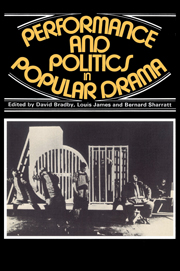 Performance and Politics in Popular Drama
Performance and Politics in Popular Drama Book contents
- Frontmatter
- Contents
- List of contributors
- Preface
- Acknowledgements
- PART ONE Spectacle, performance and audience in nineteenth-century theatre
- PART TWO Politics and performance in twentieth-century drama and film
- Introduction
- Meyerhold and Eisenstein
- Erwin Piscator's 1927 production of Hoppla, We're Alive
- Prolet Buehne: agit-prop in America
- Workers' theatre 1926–36
- The October Group and theatre under the Front Populaire
- Only the stars survive: disaster movies in the seventies
- PART THREE Problems and prospects
- Appendix: Tempo, Tempo
- Select bibliography
- General index
- Index of titles of plays, films, sketches
- Index of theatres, theatre companies and groups
Prolet Buehne: agit-prop in America
Published online by Cambridge University Press: 08 March 2010
- Frontmatter
- Contents
- List of contributors
- Preface
- Acknowledgements
- PART ONE Spectacle, performance and audience in nineteenth-century theatre
- PART TWO Politics and performance in twentieth-century drama and film
- Introduction
- Meyerhold and Eisenstein
- Erwin Piscator's 1927 production of Hoppla, We're Alive
- Prolet Buehne: agit-prop in America
- Workers' theatre 1926–36
- The October Group and theatre under the Front Populaire
- Only the stars survive: disaster movies in the seventies
- PART THREE Problems and prospects
- Appendix: Tempo, Tempo
- Select bibliography
- General index
- Index of titles of plays, films, sketches
- Index of theatres, theatre companies and groups
Summary
Unlike Germany during the 1920s, America had no apparent need for an active agit-prop movement. The United States had not been beaten in the war and for the time being seemed prosperous and secure. As a decade, the twenties was radically different in Europe. It was characterised by the inadequacies of a failed capitalist system and punctuated with the resultant class conflict. In these circumstances an orientation towards Marxist politics and thus Marxist cultural forms is inevitable. However, the excessiveness of twenties America completely obfuscated the need for such a culture. Throughout the decade which produced Piscator's agitational revues, the revolutionary experimentation of the Soviet Lef group, particularly Mayakovsky and Eisenstein, and the coalescence of the Blue Blouse movement, America formulated little or no Marxist-based theatrical culture. Besides the limited appeal of the New Playwrights Theatre and the predictable realism of workers' club performances, American theatre was devoid of political commitment.
In 1926 there was nothing to distinguish the Prolet Buehne from New York's other European immigrant groups. They were the official dramatic wing of an arbeiterbund. The Prolet Buehne's function was to provide a dramatic outlet for German immigrant workers and promote theatrical activities in New York's predominantly Germanspeaking Yorkville area. With the arrival of Hans Bohn from Germany in 1928 the group soon became independent of their arbeiterbund and assumed a determinate, activist policy. Over a period of five years Bohn (who anglicised his name to John Bonn) and Ann Howe guided the Prolet Buehne to the vanguard of American revolutionary theatre. Their contribution to the radicalisation of the American stage has been ignored or understated ever since.
- Type
- Chapter
- Information
- Performance and Politics in Popular DramaAspects of Popular Entertainment in Theatre, Film and Television, 1800–1976, pp. 201 - 212Publisher: Cambridge University PressPrint publication year: 1980
- 1
- Cited by
